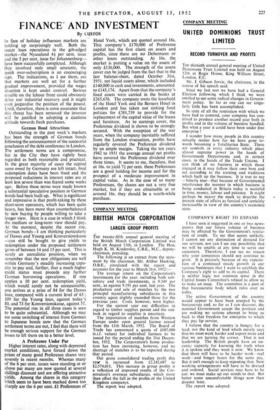FINANCE AND INVESTMENT
By C US I' OS holding up surprisingly well. Both the recent loan operations in the gilt-edged market—the Nyasaland 41 per cent. issue and the 5 per cent, issue for Johannesburg— have been successfully completed. Although they involved only small amounts, the quick over-subscription is an encouraging sign. The indications, as I see them, are that markets are well set for a further gradual improvement, provided the wages situation is kept under control. Serious trouble on the labour front could obviously delay our industrial recovery and it might even jeopardise the position of the pound. Until, therefore, there is some assurance that this threat has been removed the investor will be justified in adopting a cautious attitude towards fresh purchases.
German Bond Attractions Outstanding in the past week's markets has been the strength of German bonds following the announcement of the successful conclusion of the debt conference in London. The settlement terms are a compromise, but in the City they have rightly been regarded as both reasonable and practical. In the great majority of cases the capital sums owed by Germany are left intact, final redemption dates have been fixed and the proposed reductions in interest rates are at least less severe than was feared some weeks ago. Before these terms were made known a substantial speculative position in German bonds had been built up. What is significant and impressive, is that profit-taking by these short-term operators, which has been quite heavy, has been more than counterbalanced by new buying by people willing to take a longer view. Here is a case in which I think the medium or long-term view should pay. At the moment, despite the recent rise, German bonds—I am thinking particularly of Dawes and Young and Konversionskasse —can still be bought to give yields to redemption under the proposed settlement terms of between 14 and 15 per cent. This is surely an unrealistic position, when we remember that the new obligations are well within Germany's steadily increasing capa- city to pay and, further, that a much higher credit status must precede any further German borrowing operations. If one applies a 10 per cent, redemption yield, which would surely not be unreasonable, one arrives at a price of 84 for the Dawes loan, compared with a current level of 63; 109 for the Young loan, against today's 80, and 73 for Konversionskasse, against 57. The potential rise in all three cases is seen to be quite substantial. Although we may see some switching of interest from German to Japanese bonds now that the German settlement terms are out, I feel that there will be enough serious support for the German issues to lift them on to a better leveL A Preference Under Par Higher interest rates, along with depressed market conditions, have forced down the prices of many good Preference shares very severely in recent months. Whereas many of the 6 per cent, issues were standing at or above par many are now quoted at several shillings discount and are offering attractive yields. Among the shares in this category which seem to have been marked down too sharply are the 6 per cent. £1 Preferences of


























 Previous page
Previous page